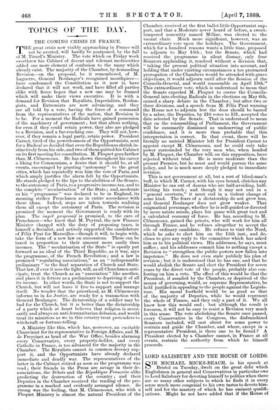TOPICS OF THE DAY.
THE COMING CRISIS IN FRANCE.
A Ministry like this, which has, moreover, an excitable Chauvinist for its representative in Foreign Affairs, and M. de Freycinet as head of the War Office, besides alarming every Conservative, every property-holder, and every Catholic in France, is too advanced for the majority in the Chamber. The Royalists cannot in common decency sup- port it, and the Opportunists have already declared immediate and deadly war. The representatives of the latter in the Cabinet retired as soon as the programme was read ; their friends in the Press are savage in their de- nunciations, the _Mats and the Republique Francaise alike predicting the destruction of the country ; and their Deputies in the Chamber received the reading of the pro- gramme in a marked and evidently arranged silence. So strong was the feeling, that M. Clemenceau, who with a Floquet Ministry is almost the natural President of the Chamber, received at the first ballot little Opportunist sup- port, and that a Moderate never heard of before, a sweet- tempered nonentity named Maine, was elected to the vacant chair. Much more significant, however, was an extraordinary vote upon the holidays. The Government, which for a hundred reasons wants a little time, proposed to adjourn to May 15th; but the Senate, which had received the programme in silent dismay, only four Senators applauding it, resolved without a division that, "taking the present political situation into account, and holding that under existing circumstances a too protracted prorogation of the Chambers would be attended with grave objections, it would adjourn until after the Session of the Councils-General, and would reassemble on April 19th." This extraordinary vote, which is understood to mean that the Senate expected M. Floquet to coerce the Councils- General into electing Radicals in the elections on May 6th, caused a sharp debate in the Chamber ; but after two or three divisions, and a speech from M. Faix Pyat warning the House not to adjourn lest the door should be barred by a sabre, the Deputies, by 210 votes to 131, accepted the date selected by the Senate. That is understood to mean that on the reassembling of Parliament, the Government will be summarily dismissed as undeserving of public confidence, and it is more than probable that this interpretation is correct. In that event, there will be literally no untried Minister left for President Carnot to appoint except M. Clemenceau, and he could only take power surrounded by the very men who, when headed by M. Floquet, the Chamber will, on this supposition, have rejected without trial. He is more moderate than the present Premier, but he must and would pursue the same policy, and he is much more deeply pledged to immediate revision.
This is not government at all, but a sort of blind-man's buff, in which M. Carnot, with his eyes bound, clutches any Minister he can out of dozens who are half-avoiding, half- inviting his touch ; and though it may not end in a "general overturn," it must end in a violent change of some kind. The fears of a dictatorship do not grow less, and General Boulanger does not grow weaker. That enigmatical personage, whether he is self-guided or directed by more astute minds, plays his game with great tact and a calculated economy of force. He has, according to M. Clemenceau, gained the priests, who will work for him all through France, and he refuses altogether to accept the r'ole of ordinary candidate. He refuses to visit the Nord, which he asks to elect him on the 15th inst., and de- clines to give any reply to the committee which has asked him as to his political views. His addresses, he says, must suffice ; and his addresses commit him to nothing except a Revision to "strengthen the public powers now fallen into impotence." He does not even state publicly his plan of revision ; but it is understood that he has one, and that he would abolish the Senate and elect the President for seven years by the direct vote of the people, probably also con- ferring on him a veto. The effect of this would be that the President, if assailed by the Chamber, or deprived of the means of governing, would, as supreme Representative, be held justified in appealing to the people against the Legisla- ture. His moral foothold would be as good as that of the majority of Deputies, while he would represent the whole of France, and they only a part of it. We all know how this would end ; but although the result is foreseen, it will not be easy to resist a Revision very much in this sense. The vote abolishing the Senate once passed, every Conservative in the Congress, the disfranchised Senators included, will cast about for some power to restrain and guide the Chamber, and where, except in a representative President, is there one to be found ? A President elected by a Chamber cannot, in France at all events, restrain the authority from which he himself proceeds.


































 Previous page
Previous page